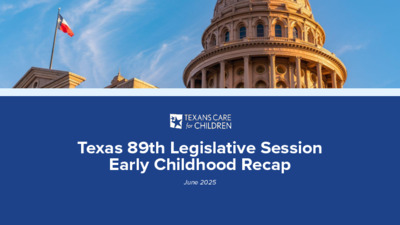Item 5: 89th TX Legislative Session Early Childhood Recap — original pdf
Backup

Texas 89th Legislative Session Early Childhood Recap June 2025 We drive policy change to improve the lives of Texas children today for a stronger Texas tomorrow. Overview Building on interim House and Senate hearings on child care and early learning, lawmakers considered numerous bills and passed several key measures affecting children and caregivers. Highlights include: ● ● $100 million for more child care scholarships $8.5 billion into public schools 3 State of the Texas Child Care ● The average waitlist for the CCS program in Texas is approximately 95,000 children. ● Child care programs are operating on barely sustainable margins (typically less than 1 percent), Texas child care educators are paid about $12 per hour with little to no benefits, and parents are paying more than they can afford – with infant care costing more than college. ● Primarily due to an inability to recruit and retain enough staff, Texas child care centers are serving only 68 percent of the kids they have room to serve. ● The lack of affordable, high-quality child care options for working families in Texas results in an estimated loss of $9.4 billion per year for the Texas economy. 4 Child Care Scholarships ● SB 1 includes $100 million investment in child care scholarships! 5 Additional Bills That Support Child Care ● SB 462 will improve the supply of child care by helping child care educators secure care for their own kids. ● SB 599 will remove local barriers to licensed and registered child care homes. ● HB 2294 will provide a new tool in the toolbox for local communities to support and incentivize child care programs who participate in the Child Care Services program. 6 Governance of Early Childhood Programs The legislature also passed a number of bills aimed at improving and streamlining the state’s governance and oversight of early childhood programs. ● HB 2310 will bring together key state agencies to develop a plan to improve early learning opportunities for young children with disabilities. ● HB 117 establishes the Governor’s Task Force on Governance of Early Childhood Education and Care. ● HB 3693 codifies the creation of an Early Childhood Integrated Data System to better assess program capacity and effectiveness. ● HB 4903 establishes a Quad-Agency Child Care Initiative to review and streamline state regulations that impact child care programs. 7 Education The legislature debated a number of education bills that covered a wide range of issues, the largest being a new Education Savings Account (ESA) program and a public school funding bill. ● SB 2 created an ESA program for private schools, child care programs, and homeschooling, which includes children eligible for public pre-k. To participate in the program child care providers must meet certain benchmarks of quality. ● HB 2 provides an $8.5 billion investment in teacher pay, special education, and school safety among other priorities. 8 HB 2 and Early Learning ● Increases the Early Education Allotment by an estimated $90 million by adding a small weight to all kindergarten through thirds grade students in Average Daily Attendance (ADA). ● In acknowledgment of the pre-k funding gap, HB 2 changes the distribution of the Early Education Allotment to be partly based on the ADA of eligible 4-year-old pre-k students. 9 HB 2 and Early Learning ● Requires TEA to designate four intermediary organizations for the purposes of pre-k partnerships. ● Creates new barriers to schools offering tuition-based pre-k for non-eligible students, starting in the 2027-2028 school year. ● Authorizes the newly designated intermediaries to verify the availability of a private child care provider before a school district could repurpose, lease, or build a classroom for eligible pre-k students. ● Includes a requirement for school districts participating in pre-k partnerships to passthrough 85% of all funds a student generates to the private child care provider. 10 ECI and Children’s Health ● Major investment in overhauling the state’s Medicaid and SNAP application systems. ● $18 million increase for the biennium to account for the rising number of infants and toddlers who need Early Childhood Intervention (ECI) services. ● HB 136 will improve support for breastfeeding by covering lactation services under Medicaid health insurance. ● HB 3940 begins to address the challenge around many newborn babies eligible for Medicaid health insurance not getting enrolled in a timely manner by providing additional information to parents and health care providers. 11 What’s next? ● Monitor Implementation: Track agency rulemaking, funding, program rollouts to ensure new policies are implemented effectively. ● Collaborate: Continue to engage with educators, families, providers, and community partners to identify gaps, share insights and align efforts. ● Plan Strategically: Use data and feedback to develop a cohesive, long-term strategy to support Texas children and caregivers. 12 Questions? lmckenzie@txchildren.org 13